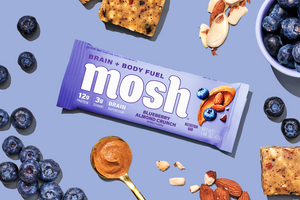The Role of Functional Foods in Brain Health
Optimizing Nutrition for Long-Term Brain Function
Nutrition and the brain are deeply interconnected. What you eat shapes how you think, feel, and age. From memory and focus to mood and long-term cognitive health, your daily diet plays a vital role in supporting brain function.
As research reveals how nutrients influence the brain, functional foods have emerged as powerful allies in everyday mental wellness.
These aren’t just healthy choices—they’re nutrient-rich foods that provide more than fuel, offering targeted support for brain health. Below, we’ll explore what makes a food “functional,” the science behind its cognitive benefits, and simple ways to incorporate them into your routine for lasting brain support.
How Does Food Affect Your Brain?
Your brain makes up just 2% of your body weight but uses over 20% of your daily energy. That energy, and the nutrients that power it, come directly from food. The connection between diet and brain function is both immediate and long-term, influencing your ability to focus now and your cognitive resilience over time.
Nutrients from food help create neurotransmitters, the chemical messengers that regulate mood, focus, and sleep. Amino acids, like tyrosine from protein-rich foods form dopamine and serotonin, while healthy fats, especially omega-3s, maintain the integrity of brain cell membranes. Complex carbohydrates like whole grains supply steady glucose, the brain’s preferred energy source, to sustain concentration and mental alertness.
Your diet also affects the brain through inflammation and oxidative stress. Diets high in added sugars and ultra-processed foods have been associated with increased inflammation, which may contribute to long-term cognitive decline. On the other hand, antioxidant- and polyphenol-rich foods like berries, leafy greens, and dark chocolate help neutralize free radicals and reduce oxidative damage to brain cells.
What Makes a Food “Functional”?
Functional foods are those that offer health benefits beyond basic nutrition. While all foods provide energy and essential nutrients, functional foods go a step further—they contain bioactive compounds that positively influence physical and cognitive function, immunity, or long-term health.
Some foods, such as blueberries, walnuts, and fatty fish, are naturally functional thanks to compounds like antioxidants, omega-3s, and polyphenols. Others are fortified with ingredients that target specific outcomes. Think of yogurt with added probiotics to support the gut-brain axis or beverages infused with citicoline to support cognitive performance.
The rise in functional foods has fueled innovation in the supplement and wellness industry. Today’s market includes everything from nootropic beverages and smart snacks to nutraceuticals that blend traditional nutrition with science-backed ingredients.
One standout example is Cognizin® Citicoline, a clinically studied nutrient now found in over 300 brain health products worldwide—from energy drinks to protein bars—formulated to support memory, focus, and brain energy.
The common thread? Functional foods are designed with purpose, whether to support brain function, aid digestion, manage inflammation, or promote overall metabolic health.
Top Functional Foods for Brain Health
Functional foods can support brain health in targeted, meaningful ways. From enhancing focus to promoting memory and long-term resilience, these foods influence the brain’s structure, signaling, and stress response.
1. Focus and Mental Clarity
Your ability to concentrate depends on steady brain energy and balanced neurotransmitters., Green tea and matcha contain caffeine and L-theanine, a combination shown to boost focus without overstimulation. Whole grains offer slow-burning carbohydrates that fuel the brain and help avoid the crash from refined sugars.
2. Memory and Learning
Healthy brain cell membranes and neuron communication are essential for learning and memory. Fatty fish, rich in omega-3s, support brain structure, while citicoline (such as Cognizin®) helps maintain phospholipid levels critical for memory.,, Dark leafy greens like spinach and kale, rich in folate and vitamin K, have also been linked to slower cognitive decline.
3. Cognitive Protection and Healthy Aging
Oxidative stress and inflammation are major contributors to cognitive decline. Foods high in polyphenols and antioxidants, like berries, dark chocolate, and extra virgin olive oil, help reduce neuroinflammation and support healthy brain aging. Regular intake is linked to better memory and reduced risk of age-related decline.
Dietary Patterns That Support a Healthy Brain
While individual nutrients matter, overall dietary pattern has the greatest impact on brain health. Two of the most well-researched options are the Mediterranean and MIND diets (Mediterranean-DASH Intervention for Neurodegenerative Delay). Both emphasize whole, plant-forward, nutrient-rich eating that reduces inflammation and supports brain aging.
The Mediterranean diet prioritizes:
-
Healthy fats from olive oil, nuts, and fatty fish
-
A high intake of vegetables, fruits, whole grains, and legumes
-
Moderate consumption of dairy and lean proteins
-
Minimal processed foods and added sugars
The MIND diet focuses on:
-
Leafy green vegetables (at least 6 servings/week)
-
Berries (at least 2 servings/week)
-
Whole grains, beans, nuts, and olive oil
-
Limiting red meat, butter, and sweets
These dietary patterns have been linked to slower cognitive aging, improved memory, and a reduced risk of Alzheimer’s disease, making them powerful strategies for long-term brain health.
Conclusion: Nourish Your Brain with Functional Foods
Your brain is always working—processing information, regulating mood, storing memories—and it depends on consistent, quality nutrition to perform at its best. Functional foods offer more than just fuel; they deliver targeted nutrients supporting focus, memory, emotional well-being, and long-term cognitive health.
By incorporating functional foods into your daily routine, whether through simple meals, smart snacks, or science-backed ingredients like Cognizin®, you’re making an investment in your mental performance and long-term brain health.
This article was written by an employee of Kyowa Hakko Bio Co., LTD, the company that owns the patent for Cognizin® Citicoline and supplies this ingredient to MOSH. The opinions expressed in this article are their own and are intended to provide valuable information to our readers.
This disclosure ensures transparency about the author’s relationship with Kyowa and the potential bias that could influence the content. It allows readers to make informed decisions while maintaining the integrity and trustworthiness of the MOSH blog.


























